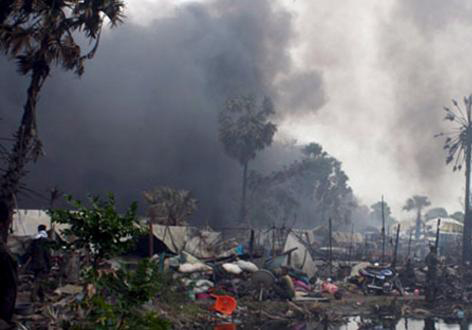A resolution adopted today by the UN Human Rights Council highlights the Sri Lankan Government’s ongoing failure to provide accountability for serious violations of human rights and the laws of war, the ICJ said.
“The ICJ welcomes this resolution as it underscores the international community’s continuing concern about the horrific atrocities committed by all sides to the Sri Lankan conflict,” said Alex Conte, Director of ICJ’s International Law and Protection Programmes. “The UN, as well as the Commonwealth and other international organizations interested in helping the Sri Lankan people, should now press and assist the Sri Lankan Government to show tangible implementation of their oft-repeated promises.”
Twenty-five States supported the resolution, following from a similar resolution adopted by the Council on Sri Lanka last year.
The resolution reiterates the need for the Sri Lankan Government to demonstrate tangible steps to ensure accountability for violations of human rights and the laws of war, especially during the final months of the three-decade long conflict in 2009.
In particular, the resolution calls on the Sri Lankan Government to implement the recommendations of its own Lessons Learnt and Reconciliation Commission (LLRC).
The LLRC was widely criticized by Sri Lankan civil society as well as international observers as falling short of international standards of providing accountability.
“Sri Lanka has a long history of promising justice but delivering impunity, and the LLRC is only the most recent example of that. With this resolution, the international community shows it wants to see concrete action,” Conte added. “Not only has the Sri Lankan Government not addressed the violations of the past, but there are strong indications that the rule of law has significantly deteriorated.”
The resolution notes with concern the ongoing reports of human rights violations being committed with impunity in Sri Lanka, including enforced disappearances, extrajudicial killings and torture.
In October 2012, the ICJ released a 150-page report Authority without Accountability: The Crisis of Impunity in Sri Lanka, documenting the systematic erosion of accountability mechanisms in Sri Lanka.
In recent months, Sri Lanka’s Government has stepped up its assaults on the independent functioning of the judiciary. In particular, the country’s Chief Justice was removed from office after she had challenged the legality of Government efforts to consolidate authority. The heavily politicized impeachment process was declared unconstitutional by the Supreme Court of Sri Lanka and was inconsistent with international human rights law and standards.
“In light of this resolution and the situation in Sri Lanka, the Commonwealth should change its plans to hold the 2013 Commonwealth Heads of Government Meeting in Colombo,” said Conte. “Sri Lanka has demonstrated its rejection of the Commonwealth Principles, notably democracy, the independence of the judiciary and human rights. This will no doubt be further confirmed when the High Commissioner for Human Rights presents her oral update to the Human Rights Council in September this year, just two months ahead of the scheduled Heads of Government Meeting.”
The ICJ has urged the Commonwealth Ministerial Action Group (CMAG), which meets next month, to address the human rights situation in Sri Lanka with the objective of removing its right to host the Heads of Government Meeting.
CONTACT:
Sam Zarifi, ICJ Asia-Pacific Regional Director, (Bangkok); t:+66(0) 807819002; email: sam.zarifi(at)icj.org
Sheila Varadan, ICJ Legal Advisor, South Asia Programme (Bangkok); t: +66 857200723; email: sheila.varadan(at)icj.org
NOTES:
- The resolution of the Council was adopted by 25 votes in favor, 13 against and 8 abstentions (with Congo, Ecuador, Indonesia, Kuweit, Maldives, Mauritania, Pakistan, Philippines, Qatar, Thailand, Uganda, United Arab Emirates and Venezuela voting against; and Angola, Botswana, Burkina Faso, Ethiopia, Japan, Kazakhstan, Kenya, Malaysia abstaining)
- The resolution was led by the United States of America and co-sponsored by Austria, Canada, Estonia, Germany, Ireland, Italy, Montenegro, Poland, Romania, Spain, and Switzerland; as well as by the following non-member States of the Council: Belgium, Bulgaria, Croatia, Denmark, Finland, France, Georgia, Greece, Hungary, Iceland, Liechtenstein, Lithuania, Malta, Monaco, Norway, Portugal, Saint Kitss and Nevis, Slovakia, Slovenia, Sweden and the United Kingdom of Great Britain and Northern Ireland.
- In January 2012, Chief Justice Dr Shirani Bandaranayake was removed in an impeachment process that violated international standards of due process and was declared unconstitutional by the Supreme Court. The impeachment was widely condemned internationally. The ICJ issued a letter supported by fifty-six senior jurists from over thirty countries worldwide.
RELATED ARTICLES:
Open letter: Sri Lanka should not host the 2013 Commonwealth Heads of Government Meeting
ICJ calls for International Commission of Inquiry on accountability in Sri Lanka
The International Commission of Jurists welcomes key Human Rights Council resolution on Sri Lanka
Sri Lanka: judges around the world condemn impeachment of Chief Justice Dr Shirani Bandaranayake




